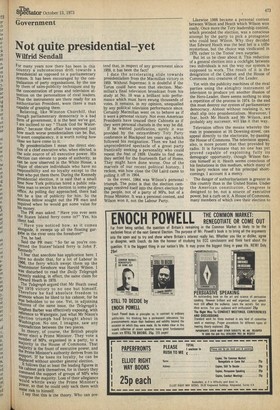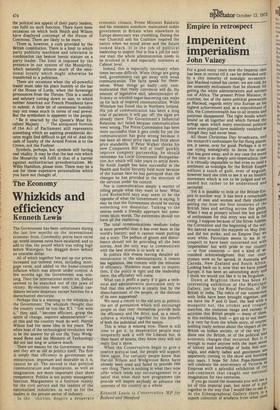Government
Not quite presidential—yet
Wilfrid Sendall
For many years now there has been in this country a subconscious drift towards a Presidential as opposed to a parliamentary System. It has been encouraged by the centralisation of party organisations, by the use by them of sales-publicity techniques and by the concentration of press and television attention on the personalities of rival leaders. Thus the instruments are there ready for an authoritarian President, were there a man capable of grasping them.
Believing, like Winston Churchill, that though parliamentary democracy is a bad form of government, it is the best we've got, I am inclined to say "Thank God for Watergate," because that affair has exposed just how much worse presidentialism can be. But, to avert complacency, it is worth noting how Close we have come to it.
By presidentialism I mean the direct election of a chief executive who, when elected, is the sole source of all executive power. His election can elevate to posts of authority, as can be now observed in the White House, a Clique of obscure individuals who have no responsibility and no loyalty except to the man who put them there. During the Kennedy Presidential election, it is said that a small time New York politician hired a public relations man to secure his election to some petty Office. As polling day approached, there had not be a line of publicity for him. So the anxious fellow sought out the PR man and inquired when he would get some value for his money. The PR man asked: "Have you ever seen the Staten Island ferry come in?" Yes, his Client had.
"Have you noticed how, as it comes alongside, it sweeps up all the floating gargabe in the river onto the foreshore?"
Yes, he had.
Said the PR man: "So far as you're concerned the Staten'Island ferry is John F. Kennedy."
I fear that anecdote has application here. 1 have no doubt that, for a lot of Labour in a66, the ferry which swept them up the westminster foreshore was Harold Wilson. I Was disturbed to read the Daily Telegraph rrecently making, in effect, the same claim for -dvvard Heath in 1970.
The Telegraph argued that Mr Heath owed his 1970 victory to no one but himself. Therefore he had absolute freedom to _Promote whom he liked to his cabinet, for he was beholden to no one. Yet, in adjoining columns of the same issue, the Telegraph's Stephen Barber was effectively exposing, with reference to Watergate, just what Mr Nixon's !,l_ection triumph had brought about in washington. No one, I imagine, saw any Contradiction between the two pieces.
In theory, of course, the British people never elect a Prime Minister. They vote a number of MPs, organised in a party, to a
111.1a y
majority in the House of Commons. That
is the fount of executive power, and the Prime Minister's authority derives from its s,o. PPort. If he loses its loyalty, he can be qlsPlaced without another general election, follows that at least the leading figures in _els cabinet pick themselves, for in theory they `-:onlmand the support of groups of MPs who `33rnprise the majority. Loss of their allegiance Would whittle away the Prime Minister's Power, so that he could only sack them with some risk to himself.
I say that this is the theory. Who can pre tend that, in respect of any government since 1959, it has been the fact?
date the accelerating slide towards presidentialism from the Macmillan victory in 1959. Without Supermac it is doubtful if the Tories could have won that election. Macmillan's final television broadcast from his study at No. 10 was a brilliant solo performance which must have swung thousands of votes. It remains, in my opinion, unequalled by any political television performance since. Certainly Macmillan went on to behave as if it were a personal victory. Not even American Presidents have treated their Cabinets as if they were personal chattels in the way he did.
If he wanted justification, surely it was provided by the extraordinary Tory Party conference at Blackpool ten years ago, which followed his resignation. Then we had the unprecedented spectacle of a great party frantically seeking a personality who could repeat the feat of 1959. Unable to find one, they settled for the fourteenth Earl of Home. They might have done worse. One of the marvels of our recent political history, I reckon, was how close the Old Laird came to pulling it off in 1964.
In the event, 1964 was Wilson's personal triumph. The point is that the election campaign resolved itself into the direct election by the people, not of a party of MPs, but of a Prime Minister. It was a personal contest, and Wilson won it, not the Labour Party. Likewise 1966 became a personal contest between Wilson and Heath which Wilson won easily. Once more the Tory leadership contest, which preceded the election, was a conscious attempt by the party to pick a protagonist who could beat Wilson. Why they decided that Edward Heath was the best bet is a trifle mysterious, but the choice was vindicated in 1970, rather to the Tories' own surprise.
But let us be clear about it. This reduction of a general election into a cockfight between two individuals is not the way our system is supposed to work. The result of it is the denigration of the Cabinet and the House of Commons into creatures of the Leader.
Yet with the publicity machines of the rival parties using the almighty instrument of television to produce yet another illusion of the Hero-Leader, there seems nothing to stop a repetition of the process in 1974. In the end this must destroy our system of parliamentary democracy. Almost without realising it, we shall slip into presidentialism. Moreover, I fear, both Mr Heath and Mr Wilson, and Probably any successor, will like it that way.
Television offers the means whereby the man in possession at 10 Downing-street, can appeal directly to the electorate, by-passing the House of Commons. The television appeal, also, is more potent that that provided by radio. It is fortunate that no one has yet proved capable of exploiting fully its demogogic opportunity, though Wilson fancies himself at it. Heath seems conscious of his limitations in this medium, which many of his party reckon one of his principal shortcomings. I account it a mercy.
The danger of authoritarianism is greater in this country than in the United States. Under the American constitution, Congress is designed to be, not a source of executive power, but a curb on it. A House of Commons, many members of which owe their election to the political sex appeal of their party leaders, can fulfil no such function. There have been occasions on which both Heath and Wilson have displayed contempt of the House of Commons. There are likely to be more.
There is, however, a curb provided by the British constitution. There is a limit to which party publicity machines and television in combination can bestow heroic stature on a party leader. The limit is imposed by the presence in our system of the Monarchy, which naturally attracts much of the emotional loyalty which might otherwise be transferred to a politician.
There are occasions when the all-powerful leader must take his place humbly at the bar of the House of Lords, when the Sovereign pronounces from the Throne. This is a useful and salutary cutting down to size, to which neither American nor French Presidents have to submit. A little bit of ceremonial humility may not mean much in terms of real power. But the symbolism is apparent to the people.
"Be it enacted by the Queen's Most Excellent Majesty . ." The antiquated formula of the Act of Parliament still represents something which an aspiring presidential dictator might find difficult to get rid of. And the oath of loyalty of the Armed Forces is to the Crown, not the Fuehrer.
Symbols, perhaps, but symbols still having real vitality. It may be that the last role which the Monarchy will fulfil is that of a barrier against authoritarian presidentialism. Mr Willie Hamilton, please note. There may be a use for these expensive personalities which you have not thought of.



































 Previous page
Previous page